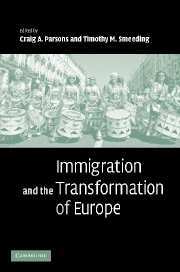Description
Immigration and the Transformation of Europe
Coordinators: Parsons Craig A., Smeeding Timothy M.
A comprehensive assessment of immigration and migration and their policy implications in twentyfirst-century Europe.
Language: English
Subject for Immigration and the Transformation of Europe:
Immigration and the transformation of Europe
Publication date: 08-2006
504 p. · 15.2x22.9 cm · Hardback
Publication date: 08-2006
504 p. · 15.2x22.9 cm · Hardback
Immigration & the transformation of Europe
Publication date: 10-2008
504 p. · 16.2x23.4 cm · Paperback
Publication date: 10-2008
504 p. · 16.2x23.4 cm · Paperback
Description
/li>Contents
/li>Biography
/li>
A new kind of historic transformation is underway in twenty-first-century Europe. Twentieth-century Europeans were no strangers to social, economic and political change, but their major challenges focused mainly on the intra-European construction of stable, prosperous, capitalist democracies. Today, by contrast, one of the major challenges is flows across borders - and particularly in-flows of non-European people. Immigration and minority integration consistently occupy the headlines. The issues which rival immigration - unemployment, crime, terrorism - are often presented by politicians as its negative secondary effects. Immigration is also intimately connected to the profound challenges of demographic change, economic growth and welfare-state reform. Both academic observers and the European public are increasingly convinced that Europe's future will largely turn on how is admits and integrates non-Europeans. This book is a comprehensive stock-taking of the contemporary situation and its policy implications.
List of figures; List of tables; List of contributors; Acknowledgements; 1. What's unique about immigration in Europe? Craig A. Parsons and Timothy M. Smeeding; 2. Europe's immigration challenge in demographic perspective Paul Demeny; 3. Migration into OECD countries 1990–2000 Peder J. Pedersen, Mariola Pytlikova and Nina Smith; 4. Divergent patterns in immigrant earnings across European destinations Alicia Adserà and Barry R. Chiswick; 5. Economic consequences of immigration in Europe Herbert Brücker, Joachim R. Frick and Gert G. Wagner; 6. Occupational status of immigrants in cross-national perspective: a multilevel analysis of seventeen Western societies Frank van Tubergen; 7. Immigrants, unemployment and Europe's varying welfare regimes Ann Morissens; 8. How different are immigrants? A cross-country and cross-survey analysis of educational achievement Sylke Viola Schnepf; 9. Immigration, education and the Turkish second generation in five European nations: a comparative study Maurice Crul and Hans Vermeulen; 10. Managing transnational Islam: Muslims and the state in Western Europe Jonathan Laurence; 11. Migration mobility in European diasporic space Jacqueline Andall; 12. The new migratory Europe: towards a proactive immigration policy? Marco Martiniello; 13. European immigration in the people's court Jack Citrin and John Sides; 14. The politics of immigration in France, Britain and the United States: a transatlantic comparison Martin A. Schain; 15. 'Useful' Gastarbeiter, burdensome asylum seekers, and the second wave of welfare retrenchment: exploring the nexus between migration and the welfare state Georg Menz; 16. The European Union dimension: supranational integration, free movement of persons, and immigration politics Adam Luedtke; 17. The effectiveness of governments' attempts to control unwanted migration Eiko R. Thielemann; Index.
Craig Parsons is Assistant Professor of Political Science, University of Oregon.
Timothy M. Smeeding is Maxwell Professor of Public Policy and Professor of Economics and Public Administration, Syracuse University.
Timothy M. Smeeding is Maxwell Professor of Public Policy and Professor of Economics and Public Administration, Syracuse University.
© 2024 LAVOISIER S.A.S.

